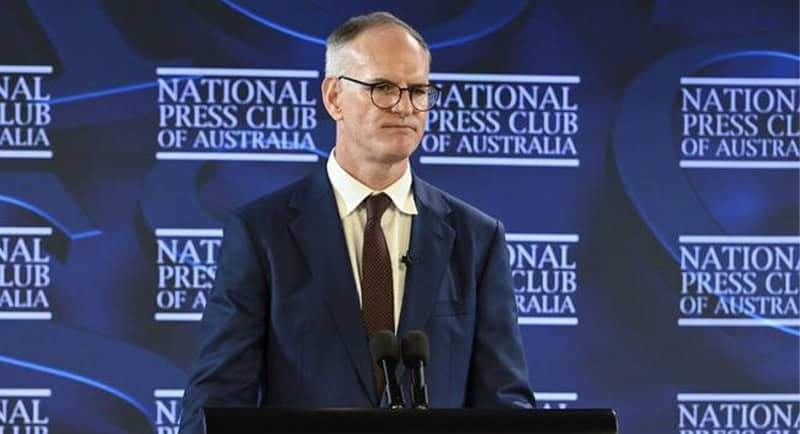Global tech giants should be subject to a social licence that forces them to pay for news and invest in mental health – and face criminal penalties if they break that licence – executive chairman of News Corp Australasia Michael Miller told the National Press Club in his Wednesday address.
“In my view, the tech monopolies are also mining companies,” Miller said. “They don’t mine our minerals, they mine our lives.”
“Those lives are Australia’s greatest resource, and we have a responsibility to protect ourselves and the way we want to live.”
He began his address – held in the midst of a major restructure at News Corp Australia – by stating: “They refuse to play by our rules.” In the space of one generation, he said, the internet has “gone from magic to madness.”
The leading cause of death among Australians aged 15 to 24 is suicide, and with mental health disorders among young people climbing nearly 50% in 15 years, Miller said: “The problem started exploding as young people became addicted to social media.”
As he put it: “The blue thumbs up has a lot to answer for.”
“In January, Facebook creator Mark Zuckerberg told a congressional hearing in Washington that ‘the existing body of scientific work has not shown a causal link between using social media and young people having worse mental health’. Government statisticians and mental health experts, and especially the parents of children we have lost, know otherwise,” Miller said.
News Corp Australia is a supporter of 36 Months, the movement recently launched by Michael ‘Wippa’ Wipfli and Rob Galluzzo to raise the social media citizenship age from 13 to 16
The pro bono social change movement launched in May aims to change federal legislation, by calling on families, community leaders, and educators to sign the 36 Months change.org petition, which will then be presented to parliament.
See also: Wippa and Galluzzo say 36 Months ‘is not an attack on social media’
Miller raised concerns that we live in a world in which fines and regulations don’t work against tech giants, though.
“When the threat of regulation comes in their direction, the tech monopoly has a playbook. They declare that they want to be regulated but no solution is ever workable for them. Then they insist that regulation should be harmonised across jurisdictions.
“The tech monopolies love to use the law to protect their right to be above the law.”
Miller proposed a solution to the Press Club in the form of a social licence – a package of laws and requirements that tech monopolies would need to meet if they want access to Australian consumers.
Under this licence, the Australian government would be able to make the platforms liable for all content that is amplified, curated, and controlled by their algorithms or recommender engines.
Miller wants the licence to include the requirement to honour the Media Bargaining Code and compensate publishers and media companies. Meta pulled out of paying for the news deals, with News Corp and Nine now lobbying for the government to ‘designate’ Meta – forcing it back to the bargaining table.
If it is designated, Meta will likely pull all news from its platforms, as it has done in Canada.
Miller also suggested that the licence should include: The requirement that each platform has an effective consumer complaints handling system, including call centres contactable by telephone with expert staff in Australia; the ex-anti-competition framework set out by the ACCC, which would address the problem of the monopolised digital advertising markets; and a contribution to the money being spent tackling mental health problems.
Miller made the point that every bank and telco has to meet the standards of complaints handling, set out by law, and that every media company is required by law to accept total responsibility for everything it publishes.
“In short, all businesses accessing Australian people play by these rules – except the tech monopolies.
“It’s time that changed. It’s time for a level playing field.”
Miller said that penalties for agreeing to the social licence but then breaking it should include criminal sanctions for companies and their executives. He also wants the power to “ultimately block access to our country and our people” if they “refuse to play by our rules”.
Miller also pointed to his discussion with mining billionaire Andrew Forrest and his campaign to stop Meta from allowing his image to be used in scam advertisements as an example of where the internet took a wrong turn.
“We have all seen these ads which hijack the faces of celebrities and respected business leaders and trick people into sending their life savings to criminals,” Miller said.
“At the height of the use of his image, up to seven different ads pretending to be Andrew were being generated every day – he has fought for years to get Meta to stop them, but they won’t.”
Another symptom Miller listed was the online scam business, which he described as “exploding” in its growth.
“The Australian recently reported on the scam-demic and the rise of scam factories in Southeast Asia. Some scam factories are as big as university campuses – one in the Philippines was made up of more than 30 buildings, and national economies are now being shaped by this new, criminal industry.
“The National Anti-Scam Centre reports that Australians lost $2.7 billion to scams last year. Globally, cyber scamming is now said to represent the world’s third-largest economy behind the US and China.”
Also making up what Miller called “the tip of a very large iceberg” are misinformation and disinformation, addiction and doom scrolling, and misogyny among young men.
–
Top image: Michael Miller
